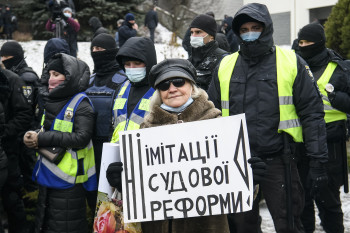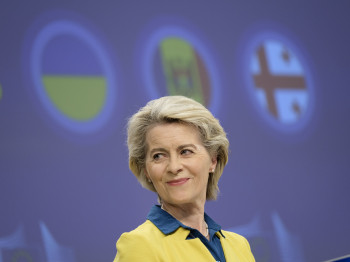Parliament appoints anti-corruption crusader to top judicial body amid botched reform

After the ongoing judicial reform was marred by several scandals, the Verkhovna Rada on Aug. 15 appointed Roman Maselko, a lawyer and well-known anti-corruption crusader, to the judiciary's main body – the High Council of Justice.
The parliament also supported the candidacy of law professor Mykola Moroz, who meets the high ethics and integrity standards required for the job, according to anti-corruption watchdogs.
The civil society is unanimous in its support of Maselko, arguing that he is a good fit for the job.
However, with officials foiling the most recent attempts to reform the judiciary by approving tainted candidates for high judicial positions, skeptics say that Maselko's appointment may become a facade for a botched reform, as he will not be able to change the system alone.
The High Council of Justice is comprised of up to 21 members and is tasked with appointing, firing, and punishing judges.
Under the current procedure, the Ethics Council approves or vetoes candidates to the High Council of Justice based on integrity standards. After the Ethics Council has its say, the candidates are appointed by parliament, the president, the Congress of Judges, the Congress of Lawyers, the association of prosecutors, and the association of law schools based on specific quotas.
Winners' background
Maselko is a long-time lawyer who has worked at anti-corruption watchdog AutoMaidan and used to head the civic oversight council at the National Anti-Corruption Bureau of Ukraine.
He became well-known for defending pro bono activists, protesters, and whistleblowers. Maselko also used to be a member of the Public Integrity Council, a judicial watchdog, and helped to promote judicial reform.
Moroz, the second member of the High Council of Justice appointed by parliament, works as an associate professor at the Kharkiv-based Yaroslav the Wise National Law University. He is less well-known than Maselko, but anti-corruption watchdogs argue he meets ethics and integrity standards.
"(Parliament) appointed two independent and worthy candidates who won the competition," Mykhailo Zhernakov, head of legal think-tank Dejure, wrote on Facebook. "One of them (Maselko) is a crusader against the judicial mafia who is widely known in Ukraine."
However, Vitaly Tytych, a lawyer and ex-head of the Public Integrity Council, argued that it will be very difficult or even impossible for Maselko to fight for judicial reform because he will be the only reformer at the High Council of Justice. The corrupt establishment still holds a majority there, he said.
Moreover, since Maselko has been a lawyer or plaintiff in many high-profile cases – such as that of whistleblower judge Larysa Golnyk – he will have to abstain from voting on them due to a conflict of interest, Tytych said. He added that there would also be restrictions on public statements by Maselko due to his role as a member of the High Council of Justice.
Tytych, who has been skeptical of the judicial reform moving forward, said that the appointment may be an attempt to appease public opinion and legitimize what he said is a botched judicial reform.
Botched judicial reform
Judicial reform is a key requirement for Ukraine’s start of accession talks with the European Union.
The Ethics Council’s task is to select members of the High Council of Justice based on ethics and integrity standards. However, the Ethics Council, which is comprised of both Ukrainian judges and Western experts, has come under fire for greenlighting tainted candidates.
In June, Ukraine’s leading anti-corruption watchdogs issued a statement saying that the Ethics Council had undermined trust in the judicial reform by approving tainted candidates for top jobs. The council denied the accusations of wrongdoing.
The watchdogs also lambasted the Ethics Council for destroying transparency. The council has banned broadcasts of its interviews with candidates, citing alleged security risks due to the ongoing Russian full-scale invasion. According to the watchdogs, the Ethics Council’s decisions may lead to “catastrophic” results both for judicial reform and Ukraine’s European integration prospects.
Anti-corruption watchdogs also criticized the Ethics Council for vetoing Larysa Golnyk in June without any reasonable grounds. Golnyk, Ukraine’s most famous whistleblower judge, has become a symbol of integrity for civil society watchdogs.












